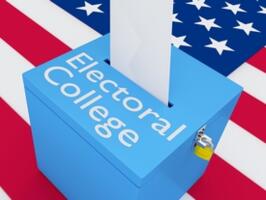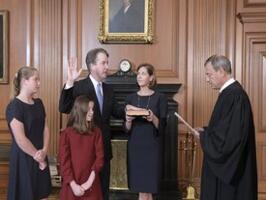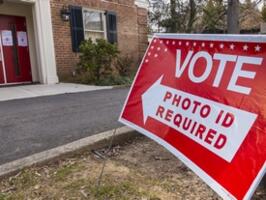Voters Have More Faith in U.S. Elections These Days
Voters are now more confident than they have been in over six years that U.S. elections are fair to voters, though more than one-in-four still think it’s too easy to vote in this country today.

Voters are now more confident than they have been in over six years that U.S. elections are fair to voters, though more than one-in-four still think it’s too easy to vote in this country today.

Voters are less enthusiastic these days about taking the Electoral College out of the presidential election process. Interestingly, opponents of the Electoral College are less likely to know what it does.

As midterm elections draw nearer, voters see President Trump as more of a positive than they did a year ago.

Republicans are madder about the Kavanaugh controversy than Democrats are and more determined to vote in the upcoming elections because of it.

It’s a done deal: Judge Brett Kavanaugh is now a member of the U.S. Supreme Court, and voters tend to think that’s okay.

Most voters disapprove of how the U.S. Senate has conducted Judge Brett Kavanaugh's confirmation process and say the U.S. Supreme Court nominee has been investigated enough.

Democrats think the FBI’s expanded background investigation into allegations of sexual assault lodged against Supreme Court nominee Brett Kavanaugh will prove fruitful. Republicans do not. Regardless, voters in both parties don’t think it will satisfy anyone.

Despite America’s increasing partisanship leading up to the midterm elections, voters actually see a little bit less of a threat of political violence than this time a year ago. And, for once, Republicans and Democrats alike agree.

The state of Missouri is wrapping up its lawsuit over voter identification laws, which the plaintiffs in the case argue are discriminatory toward certain groups of people. Other states across the country, nonetheless, are attempting to enact their own voter identification laws leading up to November’s midterm elections.

An angry Judge Brett Kavanaugh told the Senate Judiciary Committee late last week: “This confirmation process has become a national disgrace. The Constitution gives the Senate an important role in the confirmation process, but you have replaced advise and consent with search and destroy.”

In the upcoming midterm elections, West Virginia will be the first state to allow voters to cast their ballots using their mobile phones, but voters are not jumping to follow suit, citing fraud concerns.

Voters are slightly more likely now to believe Christine Ford’s allegations of sexual assault against U.S. Supreme Court nominee Brett Kavanaugh, but last Thursday’s high-profile Senate hearing didn’t change many minds. Most voters still think Kavanaugh’s Senate confirmation is likely.

As America becomes more familiar with Brett Kavanaugh, voters are developing strong opinions about the Supreme Court nominee, but their willingness to vote for senators who support him hasn’t wavered.

President Trump reinforced his “America First” doctrine at the United Nations this week in a rejection of globalism, but nonetheless, voters still support our continued involvement in the UN and a growing number say the United States should continue to be the organization’s biggest benefactor.

As the Senate Judiciary Committee prepares today to hear details of accuser Christine Ford’s allegation of sexual assault against Supreme Court nominee Brett Kavanaugh, America is a nation evenly divided against itself. Kavanaugh adamantly denies the charge.

With a new spending bill heading through Congress once again to keep the government operating, most voters don’t see significant government spending cuts coming anytime soon, even though they think those cuts are good for the economy.

It’s a rallying cry for President Trump: “Make America Great Again.” But nearly two years into Trump's presidency, almost half of U.S. voters think more needs to be done.

Congress is set to pass a spending bill this week to avoid another partial government shutdown, but most voters think any new spending should be offset by cuts in other areas of the budget.

Senate Majority Leader Mitch McConnell insists the U.S. Senate will vote on Supreme Court nominee Brett Kavanaugh, and most voters still support that decision. There’s also only slightly less urgency in their minds about getting the job done.

Several high profile actors, politicians and journalists have been accused of sexual wrongdoing in the wake of the #MeToo movement. But most voters think these public figures aren’t getting a fair shake by the media.